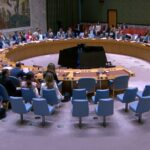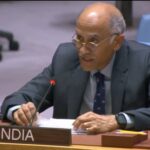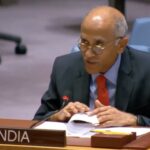Speaking at the United Nations High-Level International Conference on “The Peaceful Settlement of the Question of Palestine and the Implementation of the Two-State Solution” on July 29, 2025, India’s Permanent Representative to the UN, Ambassador Parvathaneni Harish, reaffirmed India’s longstanding support for the Two-State solution and emphasized the urgency of renewed international engagement.
Ambassador Harish described the conference as an important opportunity to reflect on progress made toward achieving peace and stability through the Two-State framework.
“Our efforts must now focus on how to bring about a Two-State solution through purposeful dialogue and diplomacy and bringing the parties to the conflict to engage directly with each other,” he stated.
He emphasized that global support for the Two-State solution must translate into “actionable steps” and called for a collective international effort to identify and implement such measures.
Acknowledging the role of France and Saudi Arabia in co-chairing the conference, he added, “I also commend the efforts of the Chairs of the eight Working Groups for their valuable contributions in outlining the broad contours and action points related to various aspects of the Two-State solution.”
Recalling the historical evolution of the issue at the United Nations, Ambassador Harish noted that since 1947, the international community has consistently advocated for the establishment of two states, Israel and Palestine, living side by side in peace and security. He further highlighted that in 1974, the question of Palestine was reintroduced to the General Assembly’s agenda, which reaffirmed the Palestinian people’s inalienable rights to “self-determination, national independence, and sovereignty.”
Citing a continued global consensus on the matter, he remarked that there is “no substitute” for a Two-State solution. He also recalled that in 1988, India was among the first nations to recognize the State of Palestine.
“I am pleased to underscore that India led by example in this regard more than 37 years ago,” he said.
During his remarks, Ambassador Harish outlined key areas requiring urgent attention. He stressed the critical importance of humanitarian assistance, especially in Gaza, where suffering continues unabated.
“Let us also not forget the plight of the hostages and their families. There can be no justification whatsoever for terrorism, for addressing any root cause or political grievance,” he stated. He underscored the need for unhindered access to essential goods for Palestinians in Gaza, noting that “humanitarian assistance is vital in sustaining life and must remain outside the realm of politics or conflict.”Civilians, including women and children, he said, have the right to lead normal lives.
Addressing the economic dimension of a future Palestinian state, he emphasized that “economic prospects and viability” are vital. While humanitarian aid remains essential, long-term peace requires the development of sustainable economic structures that foster hope, investment, and employment. He noted that India has committed approximately $160 million in developmental assistance to Palestine and continues to partner with both the Palestinian Authority and the United Nations to implement impactful, human-centric projects.
Security, the Ambassador noted, is a shared concern. He called for stable and mutually agreeable arrangements that address the security needs of both Israelis and Palestinians.
“A sovereign, viable, and independent State of Palestine within recognized and mutually agreed borders, living side by side with Israel in peace and security, is a prerequisite for enduring peace and sustainable development,” he said.
Outlining India’s immediate priorities, he added, “India has also been clear on the measures that must be undertaken in the short term – An immediate ceasefire, sustained and unimpeded humanitarian assistance, release of all hostages, and the path of dialogue and diplomacy. There are no alternatives to these measures. We appreciate the efforts of all friendly states that have facilitated such measures between the parties.”
Ambassador Harish cautioned by urging practical action, saying, “Let us not be content with paper solutions but strive to achieve practical solutions that actually make a tangible difference in the daily lives of our Palestinian brothers and sisters. India expresses its complete readiness to contribute to this noble endeavor.”
U.S. Criticizes UN Conference as Counterproductive
Meanwhile, the U.S. State Department issued a strongly worded statement on July 28, criticizing the UN conference as “an unproductive and ill-timed conference on the two-state solution.” The statement described the event as a “publicity stunt” occurring in the midst of delicate diplomatic efforts.
The U.S. argued that the conference would “prolong the war, embolden Hamas, and reward its obstruction and undermine real-world efforts to achieve peace.” Secretary Marco Rubio, according to the statement, regarded the conference as “a slap in the face to the victims of October 7th and a reward for terrorism.”
“It keeps hostages trapped in tunnels. The United States will not participate in this insult but will continue to lead real-world efforts to end the fighting and deliver a permanent peace,” the statement added.
The U.S. also criticized French President Emmanuel Macron’s announcement regarding the recognition of a Palestinian state, saying the move was welcomed by Hamas and undermined diplomatic progress.
“This reflects a pattern of counterproductive gestures that only emboldens Hamas, encourages its obstruction of a ceasefire, and greatly undercuts our diplomatic efforts to end the suffering in Gaza, free the hostages, and move the whole Middle East towards a brighter and more prosperous future,” the statement noted.






